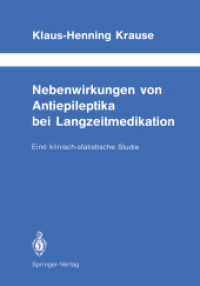- ホーム
- > 洋書
- > 英文書
- > Cinema / Film
Full Description
German history films that focus on utopianism and political dissent and their effect on German identity since 1989.
Since unification, a radical shift has taken place in Germans' view of their country's immediate past, with 1989 replacing 1945 as the primary caesura. The cold-war division, the failed socialist state, the '68 student movement, and the Red Army Faction -- historical flashpoints involving political oppression, civil disobedience, and the longing for utopian solutions to social injustice -- have come to be seen as decisive moments in a collective history that unites East and West even as it divides them. Telling stories about a shared past, establishing foundational myths, and finding commonalities of experience are pivotal steps in the construction of national identity. Such nation-building is always incomplete, but the cinema provides an important forum in which notions of German history and national identity can be consumed, negotiated, and contested. This book looks at history films made since 1989, exploring how utopianism and political dissent have shaped German identity. It studies the genre - including popular successes, critical successes, and perceived failures - as a set of texts and a discursive network, gauging which conventions and storylines are resilient. At issue is the overriding question: to what extent do these films contribute to a narrative that legitimizes the German nation-state?
Mary-Elizabeth O'Brien is Professor of Germanand The Courtney and Steven Ross Chair in Interdisciplinary Studies at Skidmore College.
Contents
Introduction
Amnesia, Nostalgia, and Anamnesis as Reactions to the Wende
In the Shadow of the Wall: Political Oppression and Resistance in the GDR
The Wild West and East of Eden: The Red Army Factionand German Terrorism
History Lessons: The Enduring Appeal of Utopianism and the Specter of Violence
Epilogue
Works Cited
Index








